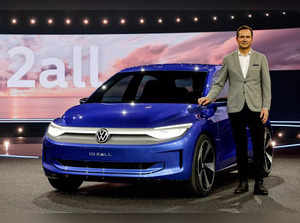 AFP
AFP"Obviously the geopolitical tensions and the developments that you see in the spheres - the Chinese sphere and the American sphere - which are not overlapping too much," Thomas Schafer, global chief executive officer, Volkswagen Passenger Cars, said in an interview.
"That it creates need to operate in each of these spheres (separately)...specifically for the auto industry it gets a bit complicated. Use of parts, technology across them is not possible. It takes a lot of extra effort. But also it makes us look a little more strategically at other opportunities. India has always been in strong focus for the group. And now the focus is even stronger."
While a blueprint is in the process of being drawn up for fresh investments, product interventions and capacity expansion in the country, the intent is to "maintain the pace" at which Volkswagen has grown in India since the implementation of the India 2.0 strategy, he said. "There is more to come for us to play stronger in India."
Huge Potential as Export Hub
These lessons will be imparted in the Volkswagen strategy even when it enters the electric vehicle (EV) segment in India.
"If you want to play in India, you need to do it properly, not halfway," he said. "This is our key learning from India 2.0. That will also play out in the electric space. The next generation (of EVs) will be fully localised."
Volkswagen is testing the ID.4 electric in India currently. This will be positioned at the more premium end of the EV market. However, a more affordable electric car - likely to be introduced after 2025 - holds more promise on volumes. "There will be an SUV on the same platform (the recently unveiled ID.2all platform) that could be an interesting car for India," he said.
“When Europe goes predominantly electric after 2033, our operations in India have to play a much more prominent role to supply to regions not moving as fast (towards electrification). There is a lot of opportunity for the team,” he said.
India already has a strong logistical setup. There is robust demand for vehicle exports to Southeast Asia, the Middle East, Africa and Mexico.
India has emerged as one of the fastest-growing markets for passenger vehicles in the world in recent times, with sales this fiscal year expected to close just short of 4 million units. Amid recessionary trends in the US and Europe, carmakers from Suzuki Motor Corp to Hyundai Motor Co and Volkswagen-Skoda have been renewing their bets on the Indian market, which is projected to emerge as the third largest for passenger vehicles shortly.
The VW Group sold around 135,000 units (including exports) in CY2022. Volkswagen and Skoda together aim to sell about 180,000 units in the ongoing calendar year and steadily grow volumes to garner a 5% market share in India by 2025.
Schäfer said discussions are ongoing with Mahindra for collaboration in the EV space but concrete plans are yet to take shape. Mahindra & Mahindra signed a term sheet with Volkswagen Group last year to source parts for electric vehicles and said it will be exploring a potential joint platform for India and emerging markets with the VW Group.
Download The Economic Times News App to get Daily Market Updates & Live Business News.
Read More News on
Download The Economic Times News App to get Daily Market Updates & Live Business News.












 Get Unlimited Access to The Economic Times
Get Unlimited Access to The Economic Times
